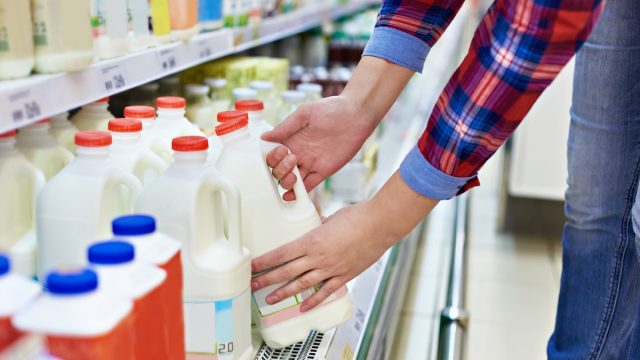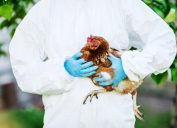Bird Flu Detected in Grocery Store Milk—What That Means for You
Experts say the current outbreak may be more widespread than previously believed.

Bird flu has been making headlines for weeks now. Also known as the highly pathogenic avian influenza (HPAI) virus, this disease usually only affects animals, and not humans. But at the beginning of April, the Centers for Disease Control and Prevention (CDC) confirmed that a person working with dairy cows in Texas had tested positive for the virus. Now, U.S. officials are warning that bird flu has also been detected in grocery store milk.
RELATED: CDC Issues New Alert After Human Case of Bird Flu in the U.S.—These Are the Symptoms.
In an April 23 update on HPAI, the U.S. Food and Drug Administration (FDA) revealed that tests show the presence of bird flu in some samples of pasteurized milk. Previously, the U.S. Department of Agriculture (USDA) had confirmed that the H5N1 strain of HPAI had been detected in raw, unpasteurized milk.
Most of the milk sold in grocery stores is pasteurized, as the FDA has strict rules against the widespread sale of raw milk.
"The pasteurization process has served public health well for more than 100 years," the agency stated in its new update. "Pasteurization is a process that kills harmful bacteria and viruses by heating milk to a specific temperature for a set period of time to make milk safer."
But does the recent discovery of H5N1 in pasteurized milk mean milk is less safe than believed? According to the FDA, that is not currently a concern.
"To date, we have seen nothing that would change our assessment that the commercial milk supply is safe," the agency said. "Even if virus is detected in raw milk, pasteurization is generally expected to eliminate pathogens to a level that does not pose a risk to consumer health."
Still, some experts are concerned about the new finding of HPAI in grocery store milk, and suggest this means the current outbreak of bird flu is more widespread than previously thought.
"The dissemination to cows is far greater than we have been led to believe," Eric Topol, MD founder of the Scripps Research Translational Institute, told CNN. "The FDA assurance that the dairy supply is safe is nice, but it's not based on extensive assessment yet, which they acknowledge."
RELATED: Largest U.S. Egg Producer Hit With Bird Flu Outbreak—Is Your Dairy Safe?
The FDA confirmed in its update that it is continuing to work to assure that pasteurized milk remains safe to consume.
"Additional testing is required to determine whether intact pathogen is still present and if it remains infectious, which determines whether there is any risk of illness associated with consuming the product," the agency said.
Meanwhile, the FDA is emphasizing its "long-standing recommendation" for consumers to not consume raw milk.
"Because of the limited information available about the possible transmission of H5N1 virus via raw milk, the FDA continues to recommend that industry does not manufacture or sell raw milk or raw milk products, including raw milk cheese, made with milk from cows showing symptoms of illness, including those infected with avian influenza viruses or exposed to those infected with avian influenza viruses," the agency stated.
The CDC says the current public health risk for bird flu is still low as well. There has only been the one human case associated with this specific outbreak, and that is the second-ever confirmed human case of bird flu in the country. The first was a person in Colorado who had direct exposure to infected poultry in 2022.
"Bird flu viruses do not normally infect humans," the agency explains, noting that there have been no reports of human-to-human spread of avian influenza viruses in the U.S. either.
Best Life offers the most up-to-date information from top experts, new research, and health agencies, but our content is not meant to be a substitute for professional guidance. When it comes to the medication you're taking or any other health questions you have, always consult your healthcare provider directly.
- Source: CDC: Update: Human Infection with Highly Pathogenic Avian Influenza A(H5N1) Virus in Texas
- Source: FDA: Updates on Highly Pathogenic Avian Influenza (HPAI)
- Source: USDA: Detection of Highly Pathogenic Avian Influenza (H5N1) in Dairy Herds: Frequently Asked Questions
- Source: FDA: Food Safety and Raw Milk
- Source: CDC: Avian Influenza A(H5N1) U.S. Situation Update





















